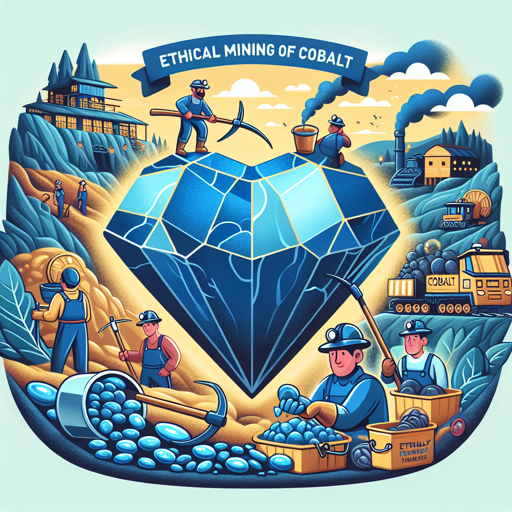The Imperative of Ethical Cobalt Mining
Exploring the importance and benefits of ethical mining practices in the extraction of cobalt.

Introduction
Cobalt, an essential element utilized in numerous applications across various industries, has been at the heart of significant ethical and environmental debates. The mining of this precious mineral has often been associated with severe human rights abuses, labor rights violations, and detrimental environmental impacts. This article delves into the importance of ethical mining practices in cobalt extraction and the benefits that such practices can bring about.
Ethical Mining: A Necessary Shift
Cobalt is an indispensable component in the production of lithium-ion batteries, which are used extensively in electric vehicles and renewable energy storage, making cobalt mining critical to the global transition towards a more sustainable future. However, this increased demand puts a strain on mining communities, especially in the Democratic Republic of Congo (DRC), which supplies over 60% of the world’s cobalt. Here, it is often mined under hazardous conditions, sometimes involving child labor.
Ethical mining practices aim to ensure that mining operations adhere to strict labor, environmental, and human rights standards. These practices encompass a broad range of actions, from implementing fair labor practices and ensuring safe working conditions to minimizing environmental damage and promoting local community development.
“Ethical mining is not just a desire, it is a need. It is a path towards a more sustainable and equitable future.” - Anonymous
The Benefits of Ethical Cobalt Mining
Fair Labor Practices
Ethical mining promotes fair labor practices, including fair wages, safe working conditions, and the prohibition of child labor. This not only improves workers’ living conditions but also boosts the productivity and sustainability of mining operations.
Environmental Protection
Ethical mining prioritizes the minimization of environmental damage. This includes efficient water management, proper waste disposal, and the use of green mining technologies. It also involves the rehabilitation of mining sites post-extraction to restore the local ecosystem.
Community Development
Ethical mining encourages the allocation of resources towards local community development. Mining companies are urged to invest in local infrastructure, education, and healthcare, fostering a mutually beneficial relationship between the mining industry and the local community.
Below is a comparison between traditional and ethical mining practices:
| Aspect | Traditional Mining | Ethical Mining |
|---|---|---|
| Labor Practices | Often exploitative, unsafe working conditions, child labor | Fair wages, safe working conditions, no child labor |
| Environmental Impact | High, often leads to pollution and ecosystem damage | Reduced, prioritizes environmental protection |
| Local Community | Often suffers from societal and environmental issues | Benefits from development projects and investments |
For more information on ethical mining practices and their importance, check this resource.
Conclusion
The extraction of cobalt is critical to our technologically-driven lives and the transition towards a sustainable future. However, it is imperative that we ensure this process is done ethically and sustainably. Ethical mining practices not only protect workers and the environment but also foster community development, creating a more sustainable and equitable mining industry. By choosing ethically sourced cobalt, we can drive the demand for these practices and make a significant impact on the world.